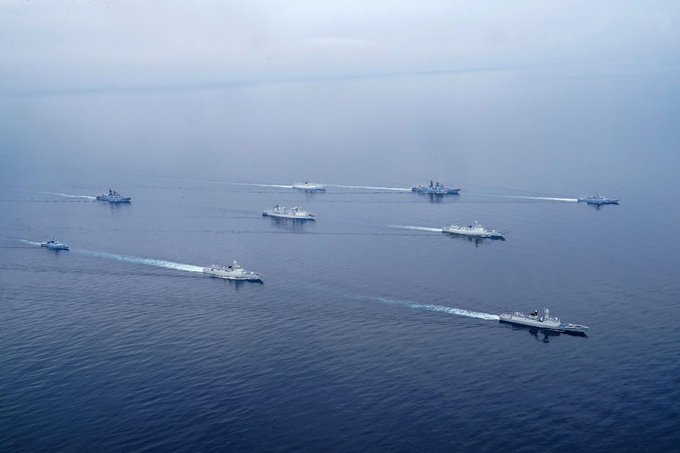Ties between Moscow and Beijing have grown closer since Russia invaded Ukraine last year, a move China has not condemned. The two have ramped up defense contacts, including joint military drills in recent months.
Three weeks ago the countries held air-and-sea exercises in the Sea of Japan which were aimed at “safeguarding strategic maritime routes”, the Chinese ministry of defense said.
The opening ceremony of China-Russia Northern/Interaction-2023 exercise was held in Sea of Japan on July 20. For the following four days, both sides will conduct joint training on maritime and air escort, deterrence and expelling, anchorage ground defense.https://t.co/oJams6fkS8 pic.twitter.com/bSf55D2k6I
— Ryan Chan 陳家翹 (@ryankakiuchan) July 22, 2023
The massive air and naval exercise in the Sea of Japan, included anti-submarine missions, sea-and-air escort training, and combat games, according to Chinese state media. Leaders said the practice runs were focused on “safeguarding” the region’s maritime transportation — possibly a mocking reference to language Biden administration has used to justify its own growing military presence in the South China Sea and Taiwan Strait.
The Chinese sent five warships, including a guided-missile destroyer. China and Russia also carried out a joint air patrol over the Seas of Japan and East China in June, when four Chinese H-6 bombers and two Russian Tu-95 bombers conducted joint patrols between Japan and South Korea and further south towards the Philippines and Guam — all bases for American forces. The operation caused both Tokyo and Seoul to scramble fighters to defend their airspace and seemed to be a warning to the leaders of the Quad nations — the U.S., Japan, Australia, and India — who were meeting in Tokyo that week.
It was the sixth such China-Russia patrol in the area since 2019.
Earlier this month, Chinese President Xi Jinping directed his military to deepen war and combat planning, the latest sign that Beijing is getting ready to execute China’s grand plan to re-establish control over Taiwan.
Meanwhile, across Taiwan, residents are preparing for attack, running defense exercises simulating a Chinese air attack, preparing civilians for what to do if China invades and live-fire exercises to test Taiwan’s combat readiness to respond to a Chinese invasion, according to the Ministry of National Defense. Daily Beast
President Biden, having explicitly pledged in September that U.S. forces would defend Taiwan in the event of a Chinese invasion, made a stunning admission in early July – the United States is running perilously low on ammunition supplies after a year and a half of arming Ukraine to help it defend itself from Russia.
We can’t even reload
Recent war games conducted by the Pentagon to simulate a U.S.-China battle over Taiwan underscored just how depleted America’s war chest is. In a fake battle simulated in April by the Center for a New American Security, U.S. forces ran out of key munitions in a matter of days, in addition to losing thousands of service members, dozens of ships, and hundreds of aircraft. This brings up a critical question – is Taiwan committed to its own defense? There are multiple indications that the answer is no. FOX/MSN
Taipei appears hesitant to increase its defense budget, even though Washington seems willing to support Taiwan’s defense needs. In the fiscal 2024 budget, some Republican members from the foreign affairs and armed services committees in Congress advocated for an increased military aid of $2 billion for Taiwan, despite cutting the broader foreign aid budget, as reported by Defense News.
The White House is also arranging to swiftly transfer U.S. arms from existing reserves to Taiwan, mirroring previous actions taken for Ukraine. However, Taiwan’s national defense expenditure remains relatively low, with an increase from 1.6% in 2016 to 2.4% of its budget, as per the Taiwan Times, compared to the U.S.’s spending of 3.5% on defense.
Moreover, details from congressional hearings indicate multiple challenges for Taiwan’s military. They reportedly lack sufficient personnel, training, weapons, equipment, and a crucial motivation to counter a potential Chinese invasion. A report from Defense News highlighted that two years ago, Taiwan’s combined military force from the Army, Air Force, Navy, and Marine Corps stood at just 153,000. This number represents only 80% of its approved strength, and frontline combat units were operating with manpower as low as 60% of full strength.
If they won’t fight, why should our kids?
Lastly, there seems to be growing concern about the military-age Taiwanese generation. They’re not interested in fighting. President Tsai, in December, acknowledged that many in Taiwan perceive military service as a “waste of time.” This sentiment was echoed by former conscripts in a CNN interview where they described the Taiwanese military service as tedious, obsolete, and unpractical.
A 25-year-old Taiwanese reservist who served last year complained that while his assigned mission was as an artilleryman specializing in cannons, he never learned to fire them because his instructors were concerned about the recruits’ safety. Instead, he spent the bulk of his time washing the cannon carts.
FOX/MSN
